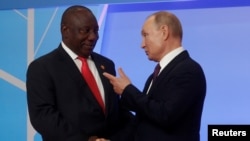ເນື່ອງຈາກມີຄຳສັ່ງຈັບກຸມ ທ່ານ ວລາດີເມຍ ປູຕິນ ຂອງສານອາຍາສາກົນ, ອາຟຣິກາໃຕ້ກຳລັງຊັ່ງຊາວ່າ ຈະເຮັດແນວໃດ ຖ້າຫາກປະທານາທິບໍດີ ຣັດເຊຍ ຕອບຮັບຄຳເຊື້ອເຊີນກ່ອນໜ້ານີ້ ເພື່ອເຂົ້າຮ່ວມກອງປະຊຸມສຸດຍອດ ໃນເດືອນສິງຫາທີ່ຈະມາເຖິງ ໃນປະເທດດັ່ງກ່າວ. ເຄທ ບາຣ໌ທເລັດທ໌ (Kate Bartlett) ລາຍງານຈາກ ນະຄອນໂຈແຮນແນັສເບີກ, ເຊິ່ງ ອາດນາສັກ ມີລາຍລະອຽດມາສະເໜີທ່ານໃນອັນດັບຕໍ່ໄປ.
ສານໃນນະຄອນ ເຮັກ (Hague) ໄດ້ອອກໝາຍຈັບຜູ້ນໍາຣັດເຊຍໃນຕົ້ນເດືອນມີນາຜ່ານມາ ໃນຂໍ້ຫາກໍ່ອາຊະຍາກຳສົງຄາມ ທີ່ກ່ຽວຂ້ອງກັບການເນລະເທດເດັກນ້ອຍຊາວຢູເຄຣນໄປຍັງຣັດເຊຍ. ອາຟຣິກາໃຕ້ ເປັນປະເທດທີ່ລົງນາມໃນ ສົນທິສັນຍາ Rome ເພື່ອສ້າງຕັ້ງສານອາຍາສາກົນ ຫຼື ICC ທີ່ບັງຄັບໃຫ້ປະເທດຕ່າງໆ ມີພັນທະຈະຕ້ອງດຳເນີນການຕາມຄໍາສັ່ງຈັບກຸມລະຫວ່າງປະເທດຂອງສານ.
ແຕ່ ປຣີໂຕເຣຍ (Pretoria) ຍັງເປັນພັນທະມິດທີ່ໃກ້ຊິດກັບມົສກູ ແລະໄດ້ຫຼີກລ້ຽງການວິພາກວິຈານການບຸກລຸກຢູເຄຣນ ໃນປີ 2022 ຂອງຣັດເຊຍ - ໄປຈົນເຖິງການເຈລະຈາສອງຝ່າຍກັບລັດຖະມົນຕີການຕ່າງປະເທດຣັດເຊຍ ທ່ານ ເຊີເກ ລາວຟຣອຟ (Sergey Lavrov) ໃນຕົ້ນປີນີ້ ແລະເປັນເຈົ້າພາບຕ້ອນຮັບກຳປັ່ນລົບຣັດເຊຍ ໃນເດືອນກຸມພາ ເພື່ອການຊ້ອມລົບທາງທະຫານຮ່ວມກັນ.
ທ່ານນາງນາເລດີ ແພນດໍ (Naledi Pandor), ລັດຖະມົນຕີການພົວພັນສາກົນຂອງປະເທດອາຟຣິກາໃຕ້, ກ່າວໃນການໃຫ້ສໍາພາດຕໍ່ສະຖານີວິທະຍຸທ້ອງຖິ່ນ SAfm ວ່າ ລັດຖະບານກໍາລັງລໍຖ້າຄວາມຄິດເຫັນທາງດ້ານກົດຫມາຍໃຫມ່ກ່ຽວກັບເລື່ອງນີ້ ແລະຈາກນັ້ນຈະພິຈາລະນາທາງເລືອກຕ່າງໆ ທີ່ມີ, ເຊິ່ງທ່ານນາງໄດ້ກ່າວວ່າ:
"ມັນເປັນສະຖານະການທີ່ຫຍຸ້ງຍາກ, ແຕ່ທ່ານຮູ້ບໍ່, ຂ້າພະເຈົ້າຄິດວ່າ ຄະນະລັດຖະບານ ຈຳເປັນຕ້ອງປຶກສາຫາລືກ່ຽວກັບເລື່ອງນີ້, ເມື່ອຂ້າພະເຈົ້າມີຄຳເຫັນ ຂ້າພະເຈົ້າຈະນໍາສະເໜີຕໍ່ຄະນະລັດຖະບານ, ດັ່ງນັ້ນ ການດໍາເນີນການຂອງພວກເຮົາຈະໄດ້ຮັບຄຳແນະນຳ ຈາກທັດສະນະໂດຍລວມ ຂອງລັດຖະບານ."
ແນວໃດກໍຕາມ, ທ່ານລັດຖະມົນຕີໄດ້ປະຕິເສດຄວາມເປັນໄປໄດ້ ຂອງການຖອນຄຳເຊື້ອເຊີນທ່ານ ປູຕິນ ໃຫ້ເຂົ້າຮ່ວມກອງປະຊຸມສຸດຍອດ ຂອງກຸ່ມປະເທດມະຫາອຳນາດທາງເສດຖະກິດທີ່ພົ້ນເດັ່ນ ທີ່ເອີ້ນວ່າ ບຣິກສ໌ (BRICS) - ເຊິ່ງລວມມີ ບຣາຊິລ, ຣັດເຊຍ, ອິນເດຍ, ຈີນ ແລະ ອາຟຣິກາໃຕ້. ອາຟຣິກາໃຕ້ ມີກຳນົດຈະເປັນເຈົ້າພາບ ຈັດກອງປະຊຸມສຸດຍອດຂອງບັນດາຜູ້ນຳຂອງກຸ່ມ ໃນເດືອນສິງຫານີ້. ມົສກູ ຍັງບໍ່ທັນໄດ້ຢືນຢັນວ່າທ່ານປູຕິນ ຈະເຂົ້າຮ່ວມດ້ວຍຕົນເອງຫຼືບໍ່.
ທ່ານນາງແພນດໍ ຍັງໄດ້ວິຈານ ICC ວ່າບໍ່ມີສິ່ງທີ່ທ່ານນາງເອີ້ນວ່າ "ຮູບແບບການປະຕິບັດທີ່ເທົ່າທຽມກັນ" ຕໍ່ຜູ້ນໍາທຸກຄົນທີ່ຮັບຜິດຊອບຕໍ່ການລ່ວງລະເມີດກົດຫມາຍສາກົນ, ແລະການສຸມໃສ່ບາງລັດ ຫຼາຍກວ່າລັດອື່ນໆ.
ແຕ່ທ່ານດາເຣນ ເບີຣ໌ກແມນ (Darren Bergman), ລັດຖະມົນຕີເງົາ ດ້ານການພົວພັນສາກົນ ຂອງພັກຝ່າຍຄ້ານຫຼັກ ຂອງອາຟຣິກາໃຕ້ ຫຼືທີ່ເອີ້ນວ່າ ພັນທະມິດປະຊາທິປະໄຕ, ກ່າວວ່າ ລັດຖະບານຕ້ອງຍຶດໝັ້ນຕາມຄຳໝັ້ນສັນຍາຕໍ່ ICC, ເຊິ່ງທ່ານໄດ້ກ່າວວ່າ:
"ພັນທະມິດປະຊາທິປະໄຕ ເຊື່ອວ່າຄະນະລັດຖະບານ ບໍ່ຄວນຂະຫຍາຍການເຊື້ອເຊີນປະທານາທິບໍດີ ປູຕິນ ອີກຕໍ່ໄປ ແລະດັ່ງນັ້ນຈື່ງຄວນຖອນການເຊື້ອເຊີນນັ້ນ. ຖ້າບໍ່ດຳເນີນການ, ພວກເຂົາຄວນຈະກຽມພ້ອມ ທີ່ຈະອອກຄຳສັ່ງຈັບກຸມປະທານາທິບໍດີ ປູຕິນ.”
ທ່ານ ສຕີເວັນ ກຣູຊດ໌ (Steven Gruzd) ນັກວິເຄາະຣັດເຊຍ ຢູ່ທີ່ສະຖາບັນການຕ່າງປະເທດອາຟຣິກາໃຕ້ ກ່າວຕໍ່ວີໂອເອວ່າ ມີຫລາຍເສັ້ນທາງທີ່ລັດຖະບານສາມາດດຳເນີນການໄດ້. ມັນສາມາດຫລີກລ້ຽງບັນຫານີ້ໄດ້ ໂດຍການເຮັດໃຫ້ກອງປະຊຸມສຸດຍອດ ບຣິກສ໌ (BRICS) ເປັນແບບອອນລາຍ, ຖອນຕົວອອກຈາກສານທັງຫມົດ, ຫຼື, ຢ່າງເປັນໄປໄດ້ຫຼາຍທີ່ສຸດ, ພວກເຂົາສາມາດພະຍາຍາມຊອກຫາການປົກປ້ອງທາງການທູດ ສຳລັບ ທ່ານປູຕິນ ໃນຖານະເປັນປະມຸກລັດ.
ທ່ານ ກຣູຊດ໌ ໄດ້ກ່າວວ່າ:
“ພວກເຮົາໄດ້ເຫັນຄວາມຫຍຸ້ງຍາກນີ້ມາກ່ອນ. ໃນປີ 2015, ທ່ານ ໂອມາຣ໌ ອັລ-ບາເຊຍຣ໌ (Omar al-Bashir) ຂອງຊູດານໄດ້ເຂົ້າມາໃນອາຟຣິກາໃຕ້ ເພື່ອເຂົ້າຮ່ວມກອງປະຊຸມສຸດຍອດສະຫະພາບອາຟຣິກາ ແລະອາຟຣິກາໃຕ້ໄດ້ຮັບຄຳສັ່ງໃຫ້ຈັບກຸມລາວ. ມີຄໍາສັ່ງຂອງສານທ້ອງຖິ່ນ. ແຕ່ສິ່ງນີ້ໄດ້ຖືກເພີກເສີຍ ແລະຖືກຕໍ່ຕ້ານ, ແລະລາວໄດ້ຮັບອະນຸຍາດ ໃຫ້ຫຼົບໜີ ຈາກຄ້າຍທະຫານແຫ່ງນຶ່ງ.”
ທ່ານລູງາ ເຄັນເກເລເລ (Lunga Ngqengelele) ໂຄສົກກົມການພົວພັນສາກົນ ແລະການຮ່ວມມືຂອງອາຟຣິກາໃຕ້ ກ່າວຕໍ່ວີໂອເອວ່າ ຄະນະລັດຖະ ບານຈະປຶກສາຫາລືກັນໃນອາທິດນີ້.
With an International Criminal Court arrest warrant out for Vladimir Putin, South Africa is weighing what to do if the Russian president accepts an earlier invitation to attend an August summit in the country.
The court in The Hague issued an arrest warrant for the Russian leader on March 17 for war crimes involving the deportation of Ukrainian children to Russia. South Africa is a signatory to the ICC's Rome Statute that obligates countries to execute the court's international arrest warrants.
But Pretoria is also a close ally with Moscow and has refrained from criticizing Russia's 2022 invasion of Ukraine – going as far as holding bilateral talks with Russian Foreign Minister Sergey Lavrov earlier this year and hosting Russian war ships in February for joint military exercises.
Naledi Pandor, South Africa's minister for international relations, told local radio station SAfm in an interview that the government was awaiting a refreshed legal opinion on the matter and would then consider its options.
"It is a difficult situation, but, you know, I think that the Cabinet needs to discuss this," she said. "Once I have the opinion I will take it to Cabinet, so our actions will be guided by the overall views of government."
However, the minister demurred on the possibility of withdrawing Putin's invitation to the summit of the group of emerging economic powers known as BRICS - Brazil, Russia, India, China, and South Africa. South Africa is due to host a summit of the bloc's leaders this August. Moscow has not yet confirmed whether Putin will attend in person.
Pandor also criticized the ICC for not having what she called an "evenhanded approach" to all leaders responsible for abuses of international law, and for focusing on some states rather than others.
But Darren Bergman, shadow minister for international relations with South Africa's main opposition party the Democratic Alliance, said the government must stick by its ICC commitments.
"The Democratic Alliance believes that the Cabinet should not be extending the invitation any more to President Putin and therefore should withdraw that invitation," he said. "If they do not, they should be ready to effect the warrant of arrest on President Putin."
Steven Gruzd, a Russia analyst at the South African Institute for International Affairs, told VOA there are a number of routes the government could take. It could dodge the issue by making the BRICS summit virtual, withdraw from the court entirely, or, most likely, he said, they could try looking for some sort of diplomatic immunity for Putin as a sitting head of state.
"We've seen this dilemma before," he said. "In 2015, Omar al-Bashir of Sudan came to South Africa for the African Union Summit and South Africa was ordered to arrest him. There was a local court order. But this was ignored and defied, and he was allowed to escape from a military base."
Lunga Ngqengelele, a spokesman for South Africa's Department of International Relations and Cooperation told VOA the Cabinet would likely discuss the matter this week.





